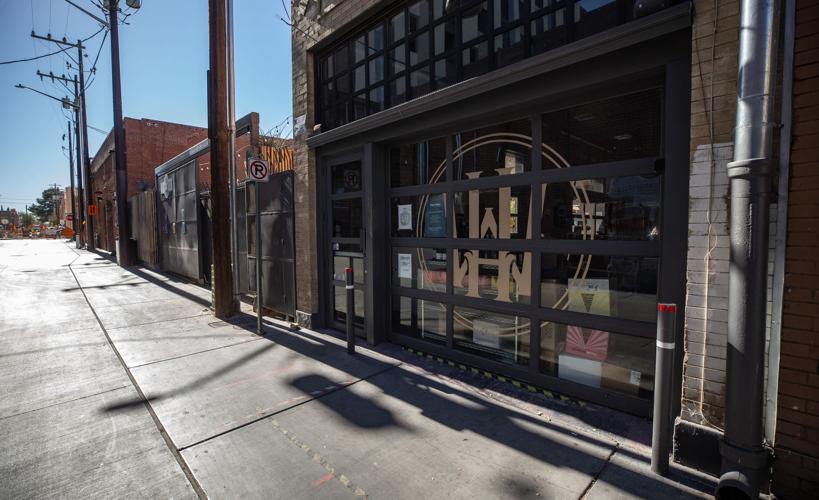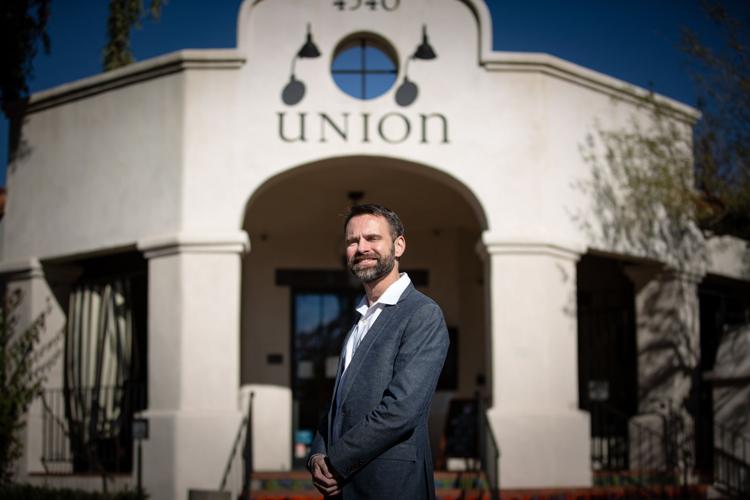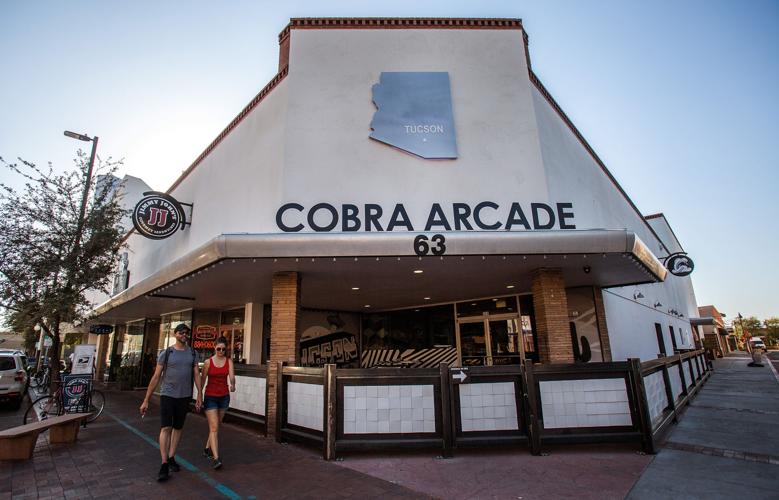A group of Tucson bars and restaurants has filed a state lawsuit seeking to overturn Pima County’s mandatory 10 p.m. curfew order as unlawful and discriminatory, saying they may be forced to close permanently if it remains in effect.
The plaintiffs, including the owners of Cobra Arcade Bar, HighWire Lounge, The Maverick and Union Public House, allege that Pima County acted without legal authority to impose the curfew between 10 p.m. and 5 a.m., which the Board of Supervisors adopted Dec. 15 on a 3-2 vote.
America held its first presidential election as voters chose electors who, a month later, selected George Washington to be the nation’s first chief executive, and more events that happened on this day in history.
The plaintiffs have requested a temporary restraining order to halt enforcement of the curfew pending resolution of the main lawsuit, but no hearing on that request had been scheduled as of late afternoon Wednesday, Jan. 6.
In a complaint filed Tuesday, Jan. 5, in Pima Superior Court, the business owners contend that the county’s curfew order violates the state constitution and an executive order by Gov. Doug Ducey that prescribed safety rules under which they could operate.
A Pima County spokesman said county officials had seen the lawsuit but had no comment.
In their complaint, the businesses detailed how the curfew, on top of monthslong closures earlier in the year, have caused crippling financial losses and layoffs and warned they would likely be forced to close permanently if the order remains in place.
Grant Krueger, owner of the Union Public House and two sister restaurants at St. Philip’s Plaza as well as The Maverick on East Tanque Verde Road, said the curfew unfairly penalized businesses like his that stay open late, even though they have shown they can operate safely during legal hours.
“If we’re following Arizona Department of Health Services guidelines – which we are … if we’re doing masks, social distancing, occupancy restrictions, spacing, and we’re doing all that correctly at 8 and 9 p.m., why can’t we also do that correctly at 10:30, or 11:30? Where is the science behind the 10 p.m. curfew? I’d like to see how the coronavirus comes out at 10:01 and affects public safety at 8:01 or 9:01.”
Krueger said the restaurants lose out on a critical sales period from 10 p.m. to 2 a.m., noting that after reopening in May after a two-month closure, his trio of restaurants were recovering to near pre-pandemic levels with expanded outdoor patio service.
“There’s just a tremendous job loss with these hours lost, and of course that translates into substantially reduced sales,” he said, noting that to ensure patrons are off the property by 10 p.m. the restaurants actually stop taking food orders at 9:30 p.m. and have last call for drinks at 9:45.
“This affects way more than just bar operations, it affects restaurants very heavily as well,” Krueger said.
Another plaintiff, HighWire Lounge owner Nicholas Eggman, said after closing its doors for months, the bar reopened in late August and, with COVID-19 measures in place, was able to recover to nearly pre-COVID-19 sales levels.
“We were able to sustain ourselves, bring employees back, pay our bills, then the curfew came along and brought everything to a standstill,” Eggman said, noting that his sales have slumped to just 12% of normal and he’s not sure how much he longer he can hold on with the curfew in effect.
In their lawsuit, the business owners say that, as the county has shown no proof that the virus spreads more easily at late-night businesses, the curfew is “unreasonable, irrational and discriminatory.”
Besides Krueger and Eggman, the other plaintiffs are Charles Duff and Ariel and Karen Bracamonte, owners of Cobra Arcade Bar, 63 E. Congress St.
The lawsuit names Pima County, County Administrator Chuck Huckelberry and the Pima County Board of Supervisors as defendants and seeks an order declaring the county acted beyond its authority and violated constitutional powers and rights to due process, and ordering the county to halt implementation or enforcement of the curfew.
Besides a temporary restraining order, the plaintiffs are seeking preliminary and permanent injunctions to halt enforcement of the curfew.
The complaint also alleges violations of the businesses’ rights to due process, since Pima County did not adopt a way for bars or restaurants to show they could operate safely after curfew hours.
“If they’re going to determine that there’s something dangerous going on, there needs to be some sort of process for these establishments and the people who depend on these establishments to show that’s not the case,” said Thomas Denker, an attorney for the business plaintiffs.
Denker said he hopes the court will schedule a hearing on the temporary restraining order within the next few days.
The supervisors acted after Tucson imposed its own 10 p.m.-5 a.m. curfew within city limits on Dec. 4.
The county curfew directly conflicts with a May 12 order issued by Ducey under what he said are his emergency powers.
Ducey’s executive order prohibited cities and counties from enacting rules stricter than the state’s, but the state has not taken action against Tucson or Pima County.
Photos for May 29: Tucson gets by during Coronavirus Pandemic
Tucson gets by during coronavirus pandemic
Updated
The iconic Casa Molina bull and matador statue both sport masks on the first full week of the loosening of COVID19 restrictions, May 23, 2020, Tucson, Ariz. The bull previously had a mask on the testicles.
Tucson gets by during coronavirus pandemic
Updated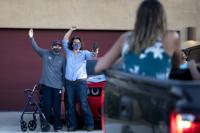
Michelle Leon Cordova, right, mother, and her son Sahuarita High School senior Lino Cordova, whom is fighting cancer, wave at staff members from Diamonds Children Center, friends and the Marana Police Department during a car parade, celebrating Lino's graduation, outside of his home on May 13, 2020 in Sahuarita, Ariz. Cordova stood on the sidewalk while the team from Diamond Children Center, friends and the Marana police department gave Cordova a graduation gar parade. Cordova was given a gift basket with his favorite snacks, gift cards as well as other items he enjoys. The car parade, also, celebrated another graduating senior fighting cancer from Empire High School, Noah Nieto. Nieto, also, received a gift basket with snacks, gift cards and other items Lino enjoys.
Tucson gets by during coronavirus pandemic
Updated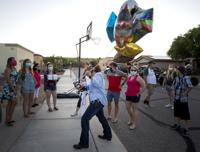
Michelle Leon Cordova, right, mother, brings celebration balloons to a car after staff members from Diamonds Children Center, friends and the Marana Police Department celebrate Sahuarita High School senior Lino Cordova, whom is fighting cancer, graduation with a car parade outside of his home on May 13, 2020 in Sahuarita, Ariz. Cordova stood on the sidewalk while the team from Diamond Children Center, friends and the Marana police department gave Cordova a graduation gar parade. Cordova was given a gift basket with his favorite snacks, gift cards as well as other items he enjoys. The car parade, also, celebrated another graduating senior fighting cancer from Empire High School, Noah Nieto. Nieto, also, received a gift basket with snacks, gift cards and other items Lino enjoys.
Tucson gets by during coronavirus pandemic
Updated
Personnel from Tucson Medical Center line the heliport to watch A-10's from Davis-Monthan Air Force Base's 355th Wing and F-16's from the Arizona Air National Guard's 162nd Wing make a pass over the facility, one leg of an area wide community flyover, May 14, 2020, Tucson, Ariz.
Tucson gets by during coronavirus pandemic
Updated
Nancy Celix-Campos, right, a respitory therapist at Tucson Medical Center, watches the military flyover with her daughters, Giana, 12, and Jazmyn, 8, from Sentinel Peak on May 14, 2020. Two F-16 Fighting Falcons from Arizona Air National GuardÕs 162nd Wing and two A-10 Thunderbolt II's from the 355th Wing, assigned to Davis-Monthan Air Force Base, fly over Tucson area hospitals to honor healthcare personnel and first responders as they are some of the frontline workers dealing with the coronavirus disease (COVID-19) head on. "It's been an exhausting two to three months," says Campos, "it's pretty cool, I like how they're going by each hospital."
Tucson gets by during coronavirus pandemic
Updated
Two F-16 Fighting Falcons from Arizona Air National Guard’s 162nd Wing and two A-10 Thunderbolt II's from the 355th Wing, assigned to Davis-Monthan Air Force Base, fly over Northwest Medical Center north of Tucson on May 14, 2020.
Tucson gets by during coronavirus pandemic
Updated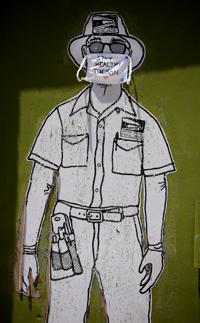
A letter carrier portrait on the Ok Market building, located in the Armory Park neighborhood, is adorned with a face mask on May 18, 2020.
Tucson gets by during coronavirus pandemic
Updated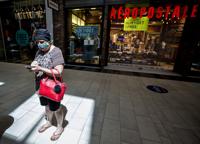
Rosemary Garcia waits for a family member outside of a store at Park Place Mall, 5870 E. Broadway Blvd., in Tucson, Ariz. on May 19, 2020. Malls reopened today under CDC guidelines and Gov. Ducey's new rules for businesses due to the Coronavirus pandemic. Park Place Mall has signs throughout the mall reminding customers to keep a six feet distance as well as hand sanitizer stations near each entrance. About half of the tables in the food court have been removed to allow for social distances as well as less than half of the stores have opened with new guidelines. Of the stores open, only 10 customers are allowed to shop in each store at a time.
Tucson gets by during coronavirus pandemic
Updated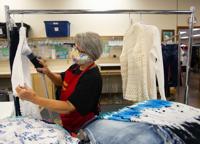
Pat Schlote steams clothing before it is put on the sales floor at the Golden Goose Thrift Shop in Catalina, Ariz., on May 21, 2020.
Tucson gets by during coronavirus pandemic
Updated
Ada Contreras, teaching assistant, looks through containers while reorganizing toys at Herencia Guadalupana Lab School, 6740 S. in Tucson, Ariz. on May 21, 2020. As Child care centers begin to re-open when they are ready, Herencia Guadalupana Lab School is reorganizing and cleaning everything in the facility before re-opening on June 2. To allow for social distancing and decrease the amount of items children touch, Herencia Guadalupana Lab School has sheds where items will go as well as placing items in containers organized by category.
Tucson gets by during coronavirus pandemic
Updated
Jen Martinez, right, softball coach, teaches Skylar Reilly about hitting during a session at Centerfield Baseball Academy, 5120 S. Julian Dr., in Tucson, Ariz. on May 21, 2020. After re-opening on Monday, Centerfield Baseball Academy has implemented new policies in response to the Coronavirus Pandemic such as wearing masks, cleaning, signage, hand sanitizer and limiting the amount of people inside the facility.
Tucson gets by during coronavirus pandemic
Updated
Karl Bosma, left, and George Cantua, with facilities and maintenance, lay down stickers to mark six-foot separation distance around one of the baggage carousels, part of the efforts at Tucson International Airport to work within the restrictions of COVID19, May 22, 2020, Tucson, Ariz.
Tucson gets by during coronavirus pandemic
Updated
A lone passenger waits for a flight near one of the shuttered restaurants in the B Gates before Memorial Day at Tucson International Airport on May 22, 2020.
Tucson gets by during coronavirus pandemic
Updated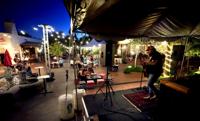
Drew Cooper on the stage in the St. Philip's Plaza courtyard, May 22, 2020, Tucson, Ariz., where live music is back on the schedule.
Tucson gets by during coronavirus pandemic
Updated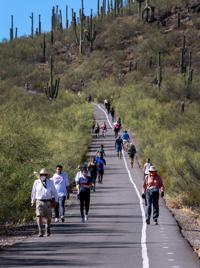
Many people visit Tumamoc Hill during the first day of Tumamoc's re-opening in Tucson, Ariz. on May 25, 2020. After being closed due to the Coronavirus pandemic, Tumamoc Hill re-opened with some modifications. There are hand sanitizer stations throughout the hike to the top as well as arrows, spaced 10-ft apart, lined up and down the hill. Some runners, hikers and walkers are also wearing masks during their hike. "The steps we are taking aim to provide our community with needed exercise, connection to our beautiful desert and a sense of comfort in such a trying time, while balancing the fact that gathering as a community endangers each of us and our loved ones. This is an unprecedented challenge that we are taking extremely seriously," said Benjamin T. Wilder, director of Tumamoc Hill. Visitors are also asked to limit their group to three people and to not touch the gate at the top of the hill- a tradition for some who make it to the top. "This is a time when we need to establish new traditions and adapt in a creative manner that embraces empathy, unity, care and patience," Wilder said.
Tucson gets by during coronavirus pandemic
Updated
Pen Macias, artist, works on part 2 of a mural for a client on E. Broadway Rd., between S. Columbus Blvd. and S. Alvernon Way, in Tucson, Ariz. on May 25, 2020. Macias, known as The Desert Pen, has been working on her clients mural for the past three months. "It's the one thing I love, I have a passion for and the only thing I could be happy doing," said Macias. The mural represents her client, a single mother of four who works in the health care field. One half of the mural is dedicated to the connection between mothers and their children. The other half is dedicated to the connection between nurses and patients. The client wanted some positivity in the mural to show how nurses give a piece of themselves to their patients hence the puzzle pieces in the nurse and the patients, said Macias.
Tucson gets by during coronavirus pandemic
Updated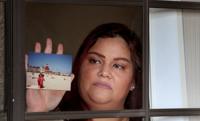
Christina Cortinas, posing at her home, May 28, 2020, Tucson, Ariz., with a photo of her and her mother, Catherine Rodriguez, in San Diego, 1991. Rodriguez is currently in assisted living and fighting COVID19. Cortinas hasn't seen her mother in months, the longest such span in her life.
Tucson gets by during coronavirus pandemic
Updated
Ruben Lopez looks through handouts while attending a Eviction Resource Fair with his family outside the Pima County Justice Court.


